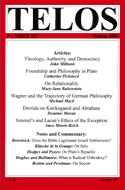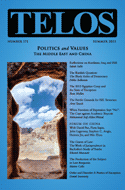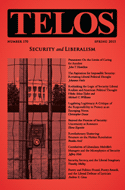By Kyle Nicholas · Tuesday, July 21, 2015  In his article “The Last of the Last: Theology, Authority, and Democracy,” from Telos 123 (Spring 2002), John Milbank argues that theology’s proper role is within the Church extended through time and space, rather than as “‘a public discourse’ answerable to the critical norms and liberal values.” Yet his claim does not come without qualification. Many aspects of theological inquiry that were once held together have splintered since 1300 CE: faith and reason, scripture and tradition, and theology under ecclesial authority, in particular. Here the Church is actually more to blame, both Protestantism and Post-Tridentine Catholicism, than some (fictional) increasingly enlightened and liberated society. In his article “The Last of the Last: Theology, Authority, and Democracy,” from Telos 123 (Spring 2002), John Milbank argues that theology’s proper role is within the Church extended through time and space, rather than as “‘a public discourse’ answerable to the critical norms and liberal values.” Yet his claim does not come without qualification. Many aspects of theological inquiry that were once held together have splintered since 1300 CE: faith and reason, scripture and tradition, and theology under ecclesial authority, in particular. Here the Church is actually more to blame, both Protestantism and Post-Tridentine Catholicism, than some (fictional) increasingly enlightened and liberated society.
Continue reading →
By Pekka Sulkunen · Monday, June 29, 2015  The Kurdish Question is a continuation of violence, protest, and repression that persist from the unfinished national state-building of the early twentieth-century Europe. This article compares it with similar but more successful ones in the Nordic countries. The Kurdish Question depends on the democratization of Turkish society. There are black holes on both sides of the conflict that absorb efforts to build democratic institutions. Enlightenment critique of absolutism in Europe established the supremacy of the social over the political order. The republic represents the will of the people. Koselleck argued that this idea potentially drifts towards totalitarianism and brutalities: those who do not obey are excluded to the point of losing their human worth. This is the heart of the Kurdish Question in Turkey today. In democracy different groups defend their interests in political movements that attempt to rule by law. In the Kurdish Question negotiable interests have been identified and reforms are on the way. The problem is that symbolic black holes absorb efforts to negotiate into the requirement of unity and consequent inability to deal with difference. On the Turkish side, the unity is imposed by the secular and modern nationalism itself. On the Kurdish side it consists of a silence about differences in the Kurd society, which is still largely tribal but with a large population outside the clan system. The Kurdish Question is a continuation of violence, protest, and repression that persist from the unfinished national state-building of the early twentieth-century Europe. This article compares it with similar but more successful ones in the Nordic countries. The Kurdish Question depends on the democratization of Turkish society. There are black holes on both sides of the conflict that absorb efforts to build democratic institutions. Enlightenment critique of absolutism in Europe established the supremacy of the social over the political order. The republic represents the will of the people. Koselleck argued that this idea potentially drifts towards totalitarianism and brutalities: those who do not obey are excluded to the point of losing their human worth. This is the heart of the Kurdish Question in Turkey today. In democracy different groups defend their interests in political movements that attempt to rule by law. In the Kurdish Question negotiable interests have been identified and reforms are on the way. The problem is that symbolic black holes absorb efforts to negotiate into the requirement of unity and consequent inability to deal with difference. On the Turkish side, the unity is imposed by the secular and modern nationalism itself. On the Kurdish side it consists of a silence about differences in the Kurd society, which is still largely tribal but with a large population outside the clan system.
Continue reading →
By Russell A. Berman · Monday, June 15, 2015 Telos 171 (Summer 2015) is now available for purchase in our store.
 Standard accounts of American politics invoke an oscillation between idealist and realist inclinations. The idealists appeal to principles, which they identify as fundamental to the American polity, especially those enshrined in the founding documents: life, liberty, and the pursuit of happiness, transformed into a broad democratization agenda. Of course, revisionist critics have no difficulty in pointing out the failure of that agenda, i.e., the extent to which the empirical history of the country fell far short of realizing its ideals. Yet even that critique, smugly put forward to debunk naïve idealism, in some basic ways is itself indebted to the same idealism, insofar as the complaint of insufficient democratization also implies a call for more democracy, the very core of the idealist program. This is why neo-conservatives and their left-liberal adversaries always had more in common than met the eye (as was abundantly clear to traditional conservatives). Standard accounts of American politics invoke an oscillation between idealist and realist inclinations. The idealists appeal to principles, which they identify as fundamental to the American polity, especially those enshrined in the founding documents: life, liberty, and the pursuit of happiness, transformed into a broad democratization agenda. Of course, revisionist critics have no difficulty in pointing out the failure of that agenda, i.e., the extent to which the empirical history of the country fell far short of realizing its ideals. Yet even that critique, smugly put forward to debunk naïve idealism, in some basic ways is itself indebted to the same idealism, insofar as the complaint of insufficient democratization also implies a call for more democracy, the very core of the idealist program. This is why neo-conservatives and their left-liberal adversaries always had more in common than met the eye (as was abundantly clear to traditional conservatives).
Continue reading →
By Timothy Melley · Tuesday, March 31, 2015
 Western societies increasingly imagine, plan, and even rehearse their own destruction. This cultural habit reflects a growing contradiction in democracy. On the one hand, liberal societies laud the ideals of participatory democracy, free speech, individual liberty, and governmental transparency. On the other, they grow ever more committed to the biopolitical regulation of life, the mitigation of threats to public health and safety, and the restriction of liberties as a way of securing liberty itself. How do we understand the inexorable growth of a security paradigm in liberal democracies? The answer lies partly in the cultural imaginary that shapes public contemplation of citizenship, liberty, and security. This imaginary reflects both the growing influence of biopolitics and the legacy the Cold War covert action. Paradoxically, the Cold War state’s growing commitment to covert action was itself increasingly public; as a result, public culture has became obsessed with, and enamored of, covert affairs. Despite state secrecy, most citizens believe they know the “kinds of things” their government is doing in secret—yet they cannot know in detail, and they receive most of their knowledge in the form of melodramatic fiction. The result is a growing irrationality in the democratic public sphere. Western societies increasingly imagine, plan, and even rehearse their own destruction. This cultural habit reflects a growing contradiction in democracy. On the one hand, liberal societies laud the ideals of participatory democracy, free speech, individual liberty, and governmental transparency. On the other, they grow ever more committed to the biopolitical regulation of life, the mitigation of threats to public health and safety, and the restriction of liberties as a way of securing liberty itself. How do we understand the inexorable growth of a security paradigm in liberal democracies? The answer lies partly in the cultural imaginary that shapes public contemplation of citizenship, liberty, and security. This imaginary reflects both the growing influence of biopolitics and the legacy the Cold War covert action. Paradoxically, the Cold War state’s growing commitment to covert action was itself increasingly public; as a result, public culture has became obsessed with, and enamored of, covert affairs. Despite state secrecy, most citizens believe they know the “kinds of things” their government is doing in secret—yet they cannot know in detail, and they receive most of their knowledge in the form of melodramatic fiction. The result is a growing irrationality in the democratic public sphere.
Continue reading →
By Telos Press · Friday, November 7, 2014 In this video from the 2014 Telos in Europe Conference, Phillip Blond of ResPublica proposes that the future stability of representative democracy, particularly in Europe, depends upon a new understanding of universals that would provide the basis of the good.
Continue reading →
By Telos Press · Wednesday, October 1, 2014 In this short video, filmed at the recent Telos Conference in L’Aquila, Editor Russell A. Berman talks about the central themes and concerns of Telos 168 (Fall 2014): The West: Its Past and Its Prospects. We have posted Russell’s full introduction here, and you can order your copy of the issue in our online store.
Continue reading →
|
|
 In his article “The Last of the Last: Theology, Authority, and Democracy,” from Telos 123 (Spring 2002), John Milbank argues that theology’s proper role is within the Church extended through time and space, rather than as “‘a public discourse’ answerable to the critical norms and liberal values.” Yet his claim does not come without qualification. Many aspects of theological inquiry that were once held together have splintered since 1300 CE: faith and reason, scripture and tradition, and theology under ecclesial authority, in particular. Here the Church is actually more to blame, both Protestantism and Post-Tridentine Catholicism, than some (fictional) increasingly enlightened and liberated society.
In his article “The Last of the Last: Theology, Authority, and Democracy,” from Telos 123 (Spring 2002), John Milbank argues that theology’s proper role is within the Church extended through time and space, rather than as “‘a public discourse’ answerable to the critical norms and liberal values.” Yet his claim does not come without qualification. Many aspects of theological inquiry that were once held together have splintered since 1300 CE: faith and reason, scripture and tradition, and theology under ecclesial authority, in particular. Here the Church is actually more to blame, both Protestantism and Post-Tridentine Catholicism, than some (fictional) increasingly enlightened and liberated society.  The Kurdish Question is a continuation of violence, protest, and repression that persist from the unfinished national state-building of the early twentieth-century Europe. This article compares it with similar but more successful ones in the Nordic countries. The Kurdish Question depends on the democratization of Turkish society. There are black holes on both sides of the conflict that absorb efforts to build democratic institutions. Enlightenment critique of absolutism in Europe established the supremacy of the social over the political order. The republic represents the will of the people. Koselleck argued that this idea potentially drifts towards totalitarianism and brutalities: those who do not obey are excluded to the point of losing their human worth. This is the heart of the Kurdish Question in Turkey today. In democracy different groups defend their interests in political movements that attempt to rule by law. In the Kurdish Question negotiable interests have been identified and reforms are on the way. The problem is that symbolic black holes absorb efforts to negotiate into the requirement of unity and consequent inability to deal with difference. On the Turkish side, the unity is imposed by the secular and modern nationalism itself. On the Kurdish side it consists of a silence about differences in the Kurd society, which is still largely tribal but with a large population outside the clan system.
The Kurdish Question is a continuation of violence, protest, and repression that persist from the unfinished national state-building of the early twentieth-century Europe. This article compares it with similar but more successful ones in the Nordic countries. The Kurdish Question depends on the democratization of Turkish society. There are black holes on both sides of the conflict that absorb efforts to build democratic institutions. Enlightenment critique of absolutism in Europe established the supremacy of the social over the political order. The republic represents the will of the people. Koselleck argued that this idea potentially drifts towards totalitarianism and brutalities: those who do not obey are excluded to the point of losing their human worth. This is the heart of the Kurdish Question in Turkey today. In democracy different groups defend their interests in political movements that attempt to rule by law. In the Kurdish Question negotiable interests have been identified and reforms are on the way. The problem is that symbolic black holes absorb efforts to negotiate into the requirement of unity and consequent inability to deal with difference. On the Turkish side, the unity is imposed by the secular and modern nationalism itself. On the Kurdish side it consists of a silence about differences in the Kurd society, which is still largely tribal but with a large population outside the clan system. 


